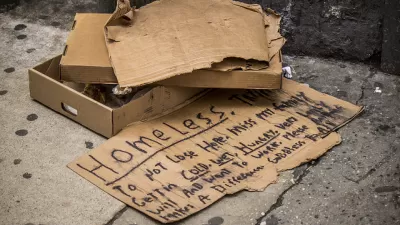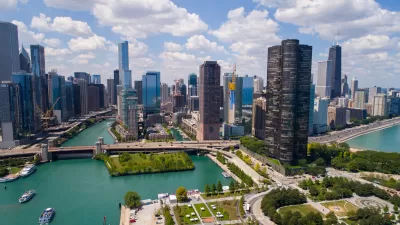A new report from the Urban Institute and the Metropolitan Planning Council looks at ways to fight perpetual segregation as Chicago's affluent white population booms.

In a trend that Tanvi Misra characterizes as "white flight, in reverse," estimates indicate that by 2030, "[Chicago's] white population will increase by 14 percent, and rich households making over $125,000 will grow by a striking 42 percent." Meanwhile, the black population will decline by 17 percent while lower-income Latinos move into surrounding suburbs.
To combat this reshuffled pattern of residential segregation, the report "offers specific policies to increase opportunity and options for residents living in historically disinvested neighborhoods, minimize the racial wealth gap, combat systemic racism, and improve health and safety. Improving access to affordable housing, according to the report, is a crucial step that helps achieve all these outcomes."
The report's recommendation to decrease local control over affordable housing proposals has provoked the strongest reactions so far, Misra says. Other recommendations include 10-year tax incentives for property owners who implement more affordable units and an expansion of the city's housing voucher program.
FULL STORY: What Will It Take to Desegregate Chicago?

Planetizen Federal Action Tracker
A weekly monitor of how Trump’s orders and actions are impacting planners and planning in America.

Map: Where Senate Republicans Want to Sell Your Public Lands
For public land advocates, the Senate Republicans’ proposal to sell millions of acres of public land in the West is “the biggest fight of their careers.”

Restaurant Patios Were a Pandemic Win — Why Were They so Hard to Keep?
Social distancing requirements and changes in travel patterns prompted cities to pilot new uses for street and sidewalk space. Then it got complicated.

Platform Pilsner: Vancouver Transit Agency Releases... a Beer?
TransLink will receive a portion of every sale of the four-pack.

Toronto Weighs Cheaper Transit, Parking Hikes for Major Events
Special event rates would take effect during large festivals, sports games and concerts to ‘discourage driving, manage congestion and free up space for transit.”

Berlin to Consider Car-Free Zone Larger Than Manhattan
The area bound by the 22-mile Ringbahn would still allow 12 uses of a private automobile per year per person, and several other exemptions.
Urban Design for Planners 1: Software Tools
This six-course series explores essential urban design concepts using open source software and equips planners with the tools they need to participate fully in the urban design process.
Planning for Universal Design
Learn the tools for implementing Universal Design in planning regulations.
Heyer Gruel & Associates PA
JM Goldson LLC
Custer County Colorado
City of Camden Redevelopment Agency
City of Astoria
Transportation Research & Education Center (TREC) at Portland State University
Camden Redevelopment Agency
City of Claremont
Municipality of Princeton (NJ)





























